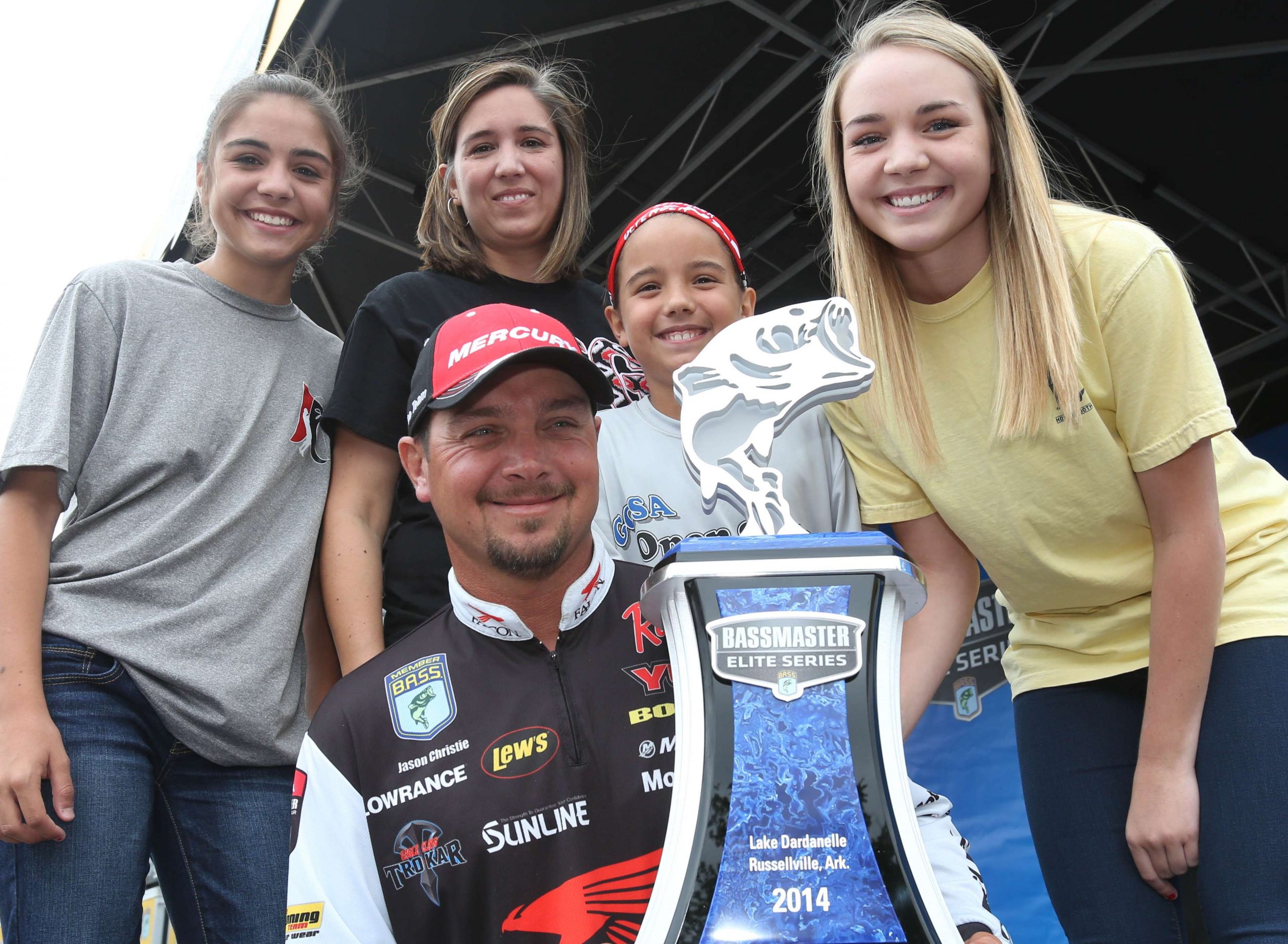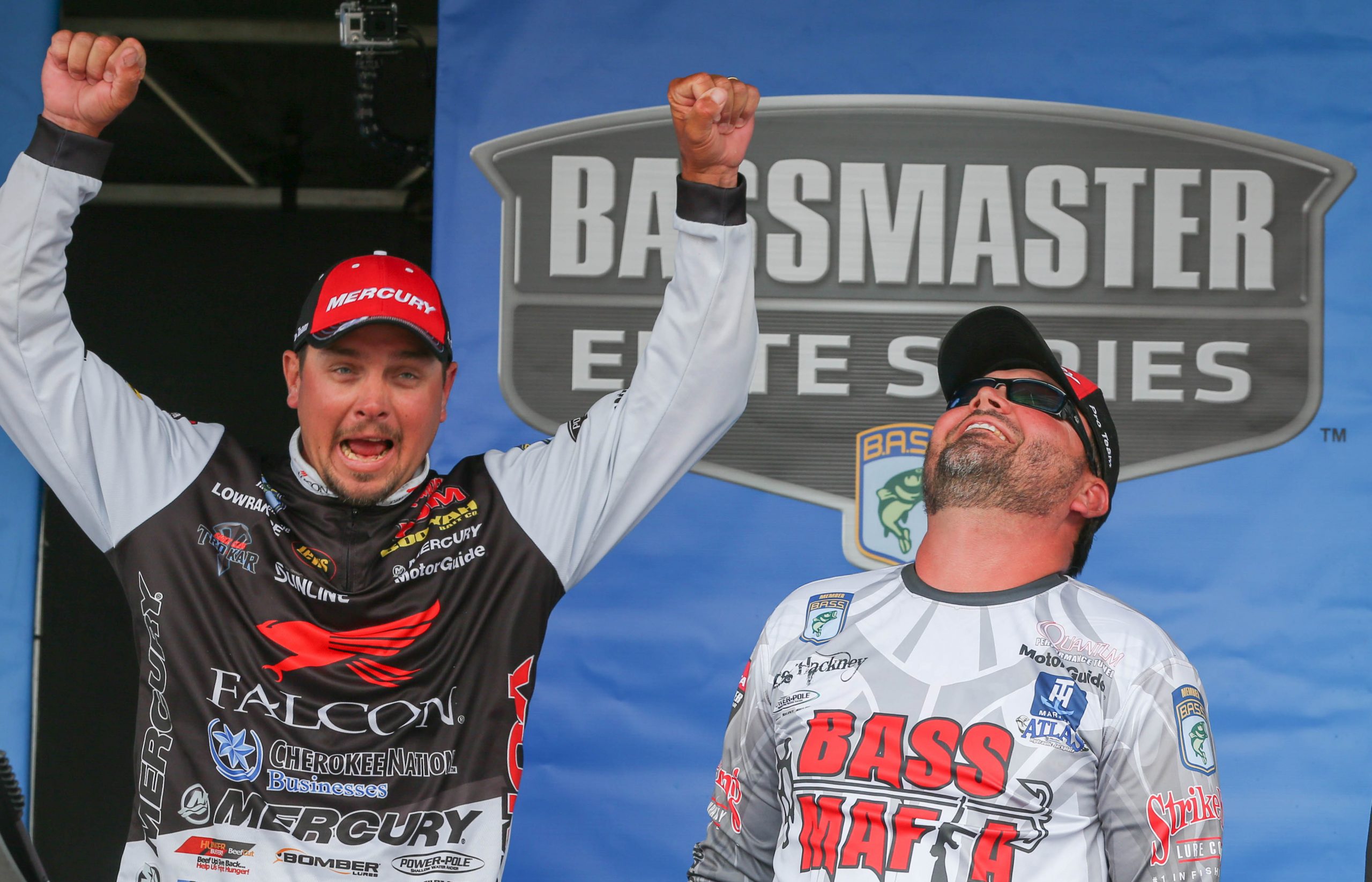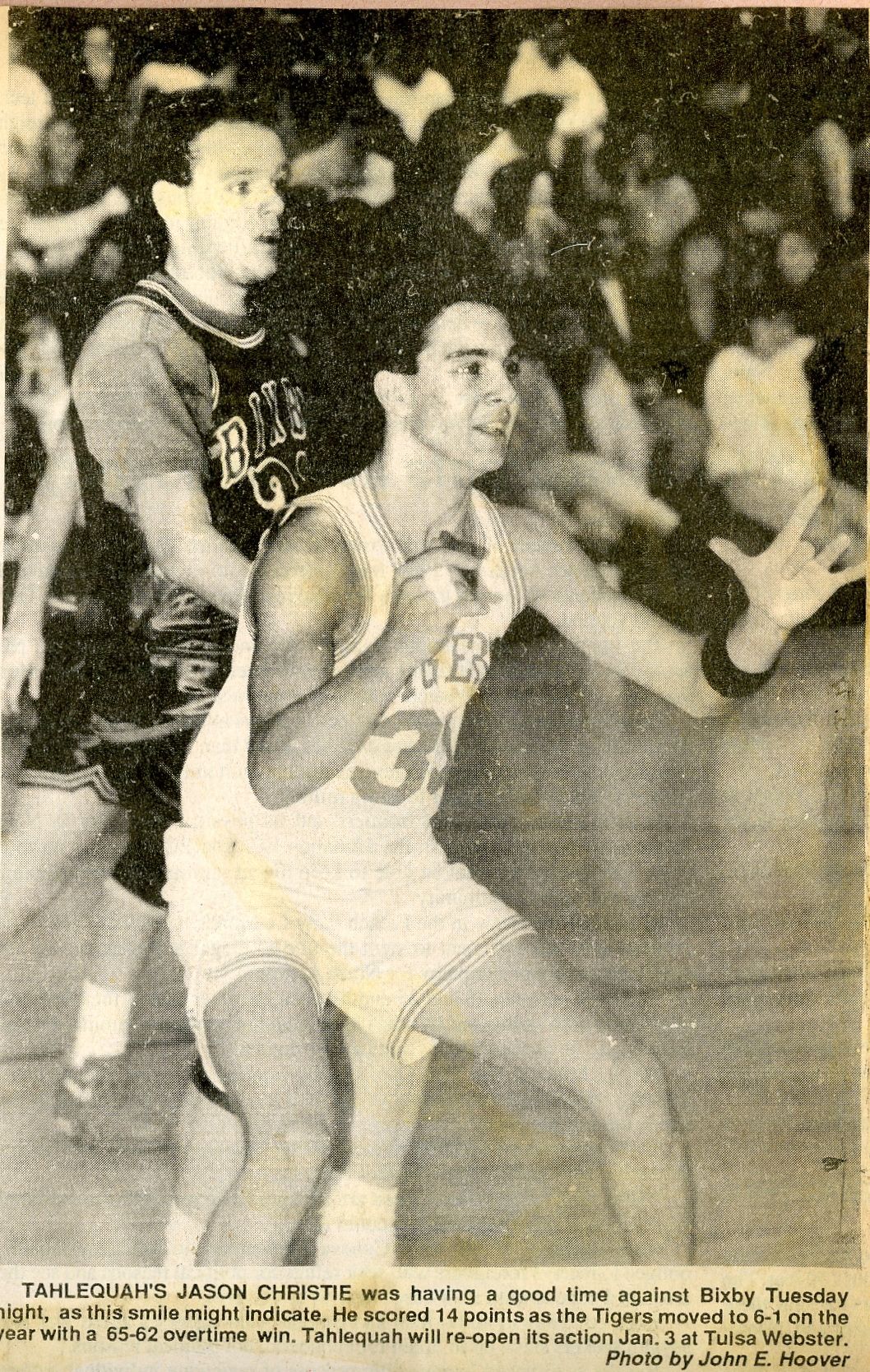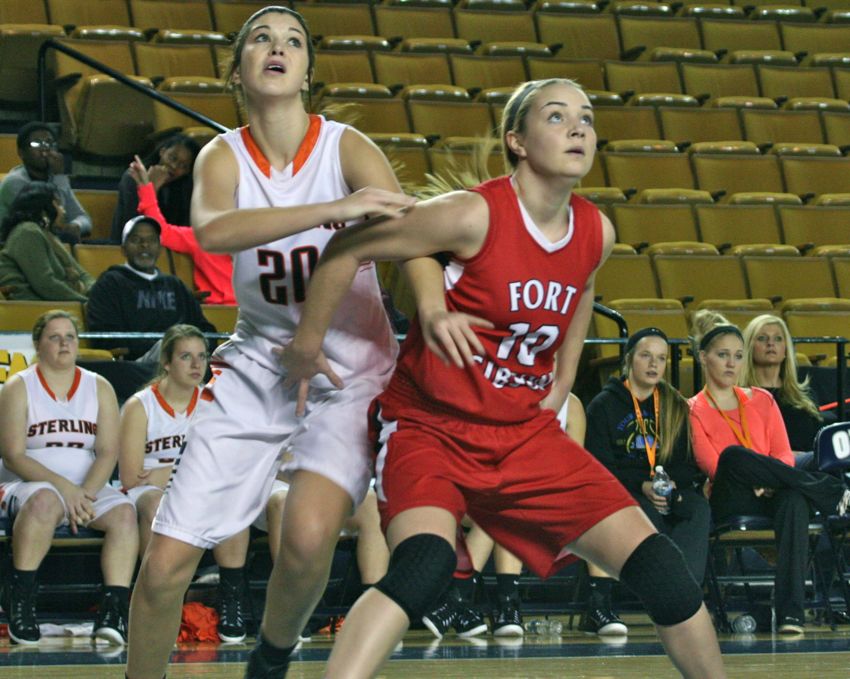
TULSA, Okla. — Jason Christie thinks he might have two distinct advantages going into the 2015 GEICO Bassmaster Classic. He hopes to exploit them with a unique game plan.
The first step in the plan was not spending a single minute of pre-practice time at the Classic site – South Carolina’s Lake Hartwell.
Christie went deer hunting instead.
“Pretty much every day from October until (Jan. 5),” said Christie. “It’s not laziness. It’s not that I like deer hunting more than fishing. Deer hunting forces me to take a break from fishing. That way I’m fresh. By December, I want to go fishing so bad I can’t stand it.”
Lake Hartwell went off-limits to the Classic qualifiers on Jan. 1. Christie’s bass fishing game plan for Hartwell began at Oklahoma’s Lake Tenkiller on Jan. 5, the day his daughters went back to school after the holiday break,
“That gives me a free ticket to go fishing,” Christie said. “When they leave in the morning to go to school, I go fishing. I’m home when they get home from school. They never know I’ve been gone.”
Christie and his wife, Amy, started dating in high school. They’ve been married for 17 years. Amy works as a pharmacist. Their children are: Ali, 16, Ana, 14, and Jaslyn, 10.
Jason spent a rare three days indoors as 2014 came to a close. He came to Tulsa’s Mabee Center on the Oral Roberts University campus to watch Ali play basketball for Fort Gibson High School in the 50th annual Tournament of Champions. Jason played for the Tahlequah (Okla.) Tigers during the 27th annual TOC in 1991.
“I’m just not an ‘inside’ person,” Christie said. “The only time I want to be inside is watching a ballgame.”
By that he means watching one in-person, not on TV. The tournament provided an opportunity to gain some insight into the 41-year-old Park Hill, Okla., resident’s approach to life in general and his third straight Bassmaster Classic appearance in particular. Basketball has been a big part of his life, too.
Christie’s advantages
Christie’s first strong point at Hartwell is his familiarity with the lake. The decision to avoid pre-practice at Hartwell was easy. Christie has fished three FLW tournaments there, including last year, when he finished 31st on March 6. Hartwell was the site of Christie’s first tour level win, an FLW tournament that ended on March 24, 2011. He placed 25th at Hartwell in an FLW event that concluded March 8, 2012.
“I’ve got a lot of confidence in that lake,” Christie said. “I like that it’s big, and it’s a pattern lake where you can figure something out. Plus, we get four days of practice at the Classic. That’s a lot of practice.”
Other than for basic orientation purposes, many anglers question the value of the pre-practice period. How much you can learn about the bass habits at any lake when the last look you get is almost two winter months before the Classic begins? But it appears you’re a slacker if you don’t take advantage of that opportunity.
That’s why the second part of Christie’s plan is most intriguing: He’s going to fish almost every day until he leaves for Greenville, S.C., on a miniature version of Lake Hartwell. And it’s located practically in his backyard. He’s definitely not slacking off.
Christie lives in Park Hill, Okla., which could loosely be described as a “suburb” of Tahlequah (pop. 16,369). Lake Tenkiller’s 13,000 acres are a five-minute drive from Christie’s house.
So what could a small Oklahoma lake have in common with Lake Hartwell’s 56,000 acres located in South Carolina’s hill country? The answer is: Just about everything.
First of all, the settings are similar. Tenkiller is located in Oklahoma’s “Green Country,” which includes the foothills of the Ozarks.
Secondly, and maybe most surprisingly, both Hartwell and Tenkiller are considered clear-water reservoirs. Oklahoma doesn’t have many of those. Fed primarily by the Illinois River that flows west from Arkansas’ Ozarks, Lake Tenkiller is recognized as the clearest body of water in the state.
“The clearest lake in Oklahoma” is a title that some might equate with “world’s tallest midget.” As proof, however, of the lakes’ similarities, a recent check of fishing conditions revealed the following: Water clarity – Tenkiller, 3 to 6 feet; Hartwell, 3 to 6 feet. Surface temperature – Tenkiller, 48 degrees; Hartwell, 49.5 degrees.
(There’s more: The lakes are at similar latitudes, and the two water surface above sea level measurements correspond as well.)
It’s difficult to imagine that, other than size, there are two more similar U.S. lakes, particularly two located 850 miles apart.
Exploiting those advantages
Christie qualified for the 2013 Elite Series and the Bassmaster Classic at Oklahoma’s Grand Lake O’ the Cherokees by winning two Bassmaster Opens in 2012. Even though it was his first Classic, Christie was considered one of the favorites on his “home lake,” where he had recorded five FLW wins in working his way up from regional tournaments since 2001. (Christie, however, has always considered Tenkiller his “home lake.”)
Christie contended at Grand Lake before finishing seventh. He finished 18th last year at Alabama’s Lake Guntersville. He spent “20 days straight” of pre-practice time at Grand; he pre-practiced at Guntersville “a few days.”

“Those didn’t turn out so good,” Christie said. “This year I want to fish the Classic the way I do Elite Series events, and that’s just show up and go fishing. I do best when I just show up for practice, turn on the graph and fish whatever is in front of me, not what I saw two months ago.”
No one has had a better previous two seasons on the major tour-level bass circuits than Christie, according to BassFan.com, which ranks B.A.S.S. and FLW competitors as one group. Christie was No. 1 at the end of 2013 and again in 2014.
Christie’s two-year highlights have included Elite Series wins at Bull Shoals (2013) and Dardanelle (2014) and FLW victories at Beaver and Grand (2013). His total winnings for the two circuits over that period are $725,756.
Not bad for a former schoolteacher and basketball coach.
The basketball connection
It’s arguable whether athletic ability helps anyone in the sport of professional bass fishing. Vertical jumping ability, for instance, doesn’t figure much in bass tournament success, other than making for some memorable celebration photos. However, if forced to choose, who wouldn’t pick an athlete over a klutz in a competition as physical as bass fishing can be?
Jason Christie is an athlete. He appears to be “one of those guys you pick first, then decide what game you’re playing later,” as John Madden once described New York Yankees shortstop Derek Jeter.
 Christie was a 6-3 guard at Tahlequah High School who could both shoot from three-point range and dunk in a crowd.
Christie was a 6-3 guard at Tahlequah High School who could both shoot from three-point range and dunk in a crowd.
Upon request, Christie provided a scrapbook of his athletic highlights that his mom once put together. A newspaper article written before his senior season at Tahlequah High School noted, “Shooting guard Jason Christie, the team’s best athlete, brings a team-high six dunks back from last year. It was often Christie who provided a steal-and-layup or a long-range trey when the Tigers needed a pick-me-up.”
Christie was recruited by several small colleges. He wasn’t going to accept any of those offers until he realized the financial burden his parents would face in paying for his college education. Christie accompanied a friend on a recruiting visit to Baccone Junior College in Muskogee, Okla.
“He was the one being recruited,” Christie recalled. “After we played that day, the coach offered me a scholarship.”
Christie’s play at Baccone over the next two years led to an offer from Northeastern State University in Tahlequah.
As a senior at NSU, Christie set a school record by hitting 10 of 18 three-point shots. He wasn’t shooting for the record; he was shooting to keep his team in a close game.
“I missed a three-pointer at the buzzer that would have won it,” Christie said. “That’s what I remember most about that game.”
After he graduated with an education degree in 1998, Christie took a teaching and coaching job at Tenkiller School, which included kindergarten through eighth grade. Becoming a pro bass fisherman wasn’t in his plans.
“I didn’t ever think about professional fishing,” Christie recalled. “You’re talking about a guy who grew up in the sticks and didn’t have a lot of money.”
See photos of Christie’s basketball days and more here.
Basketball and bass fishing
“Decisions,” that was the word repeated constantly when University of Arkansas basketball coach Nolan Richardson stamped his “40 minutes of hell” style on the Razorbacks and led them to three NCAA Final Four appearances, including the 1994 championship. Richardson wanted his players to practice making quick decisions, then force opponents into making quicker decisions than usual, and, therefore, mistakes.
Bass tournament fishing and basketball aren’t as different as you might imagine.
“There are more similarities than people think,” Christie said. “The biggest thing to me is the mental game. In basketball, you’re going to have some advantages if you’re 6-6 that you don’t have if you’re 5-6. But you see those hard-workers that are mentally tough make it so much farther than they might have.”
The only people that talk about decisions more than basketball coaches are bass tournament anglers. In a recent example, Randy Howell’s decision to go one way instead of another on the final day at Lake Guntersville was crucial in his winning the 2014 Classic.
While Christie will be competing in only his third Bassmaster Classic, he has been making those quick, difference-making decisions for a long time – both on the basketball court and on the water.
“My dad did a lot of fishing and four of his brothers liked to fish,” Christie said. “I fished with one (uncle) a lot, and I fished with every one of them some. They taught me so quick, then they turned me loose to make those decisions.
“To me, that’s how you learn in bass fishing – making decisions. Good or bad, they all go into the file.”
The courage to change
Shortly after Christie started his teaching/coaching career, he began having success on state and regional FLW circuits. He won an Okie Division BFL event on Grand Lake in 2001. By 2007, after winning $65,000 in a Stren Series event on Lake of the Ozarks, Christie had a decision to make: Go pro or stay home.
It wasn’t an easy choice. Christie was nine years into his career, and he’d had offers to move up to the high school coaching ranks. But his love of the outdoors led him to decline those offers.
“In coaching at a K-through-8 school, I’d get out at 4 o’clock, and I could go fishing or hunting,” Christie said. “Plus my kids were starting at that school, so I could be around them throughout the day.”
On a Saturday in February 2008, Christie’s eighth-grade Tenkiller teams, both boys and girls, won state championships.
“I was more proud of the job I did with the girls team,” Christie said. “I think the boys would have won without a coach.”
Later that night, neither team had a coach. Christie turned in his resignation.
“It was a decision I’d already made before the outcome of the state tournament,” Christie said. “I was able to put back some money after that win on Lake of the Ozarks. I’d already paid my deposits (for 2008).”
Like father, like daughter
 It appears the acorn hasn’t fallen far from the oak, in terms of basketball talent in the Christie family. Ali is a 5-foot-11 sophomore on the Fort Gibson High School Lady Tigers, who have won three of the last four Oklahoma 4A state championships.
It appears the acorn hasn’t fallen far from the oak, in terms of basketball talent in the Christie family. Ali is a 5-foot-11 sophomore on the Fort Gibson High School Lady Tigers, who have won three of the last four Oklahoma 4A state championships.
“If I could get an Ali Christie every year, I’d be in good shape,” said Fort Gibson head coach Jerry Walker. “Ali has a high upside. We really like her. She has the ability to play multiple positions, and she gets off the floor as well as anybody I’ve ever coached.
“She’s an intelligent young lady of high character. Plus, she’s got a good background. I think her dad’s competitive instinct in fishing at a high level has rubbed off on her.”
Christie isn’t a starter, but she plays a lot in Walker’s system, which employs “eight to 10 kids every night.”
Walker’s emphasis on team basketball and a deep roster has helped Fort Gibson reach the 4A state finals in seven of the last nine years.
“Our motto is ‘Tradition Never Graduates,'” Walker said.
Christie scored 24 points over three games as Fort Gibson finished 2-1 in the tournament. An overtime loss to Muskogee in the opening round dropped Fort Gibson into the consolation bracket. It marked only the team’s fifth loss in the past five seasons.
The annual Oklahoma Tournament of Champions is a big deal with a “Hoosiers” feel. The event pits the best high school teams in the state, regardless of classification, against each other.
“That’s what’s special about this tournament,” Christie said. “This year there was a school with an enrollment of 3,000 playing a school with 120 students.”
The Christie deer-hunting team
Meanwhile, Jason Christie is developing a team of deer hunters. Christie wrote a column last fall for bassmaster.com entitled, “My Daughters Can Out-Hunt You!” All three have killed whitetail deer with a rifle. Christie began introducing Ana to bow-hunting last fall.
Much of the time that Christie spends deer hunting in the fall and winter includes at least one of his daughters.
“That’s important to me,” Christie said. “My girls like to hunt. They don’t have to see a deer to have a good time.”
In late December, Christie and Ana were in a tree-stand, hoping for a doe she could shoot with her bow, when an eight-point, 130-inch class buck approached.
“That’s a giant for our area,” Christie said. “It came in and stopped at about 20 yards. It stayed there for about 20 minutes, but she didn’t get a shot. I was sitting above her a little bit. I could see the broadhead on the end of her arrow. It was shaking like you wouldn’t believe.
“To her, that deer looked like a moose. That was a great learning experience for her.”
Christie’s entire family likes to hunt and fish, including his wife.
“As the kids get a little bit older, I think Amy will be the one I take hunting and fishing all the time,” Christie said.
Christie’s final plans
On paper, it’s hard to pick any obvious flaws in Christie’s approach to the Bassmaster Classic. His emphasis has been on two key factors: 1. Starting the new year mentally refreshed; and, 2. Spending as much time as possible outdoors, bass fishing on a lake like Hartwell in the weeks leading up to the tournament.
“I’ll go fishing every day until I go to the Classic,” Christie said. “That gets me used to the cold weather. It gets me back in fishing shape, physically and mentally. Tenkiller is a very diverse lake. I can do whatever I want.
“But I’ll be on that lower end in the clear water, getting confidence in different baits and stuff like that, breaking in a new boat.
“The biggest thing, though, is just being on the water when it’s cold and getting in shape physically for standing up in a boat and making casts for 8 to 10 hours a day again. That’s hard. The first few days it’s all I can do to stay awake when I get home.”
He might even make the 90-minute drive to Grand Lake, which covers 46,000 acres, and compares more closely in size to Lake Hartwell.
“It’s just a confidence deal,” Christie said. “If I’m catching the heck out of them at Tenkiller or Grand, it’s going to carryover to the Classic.”
He added, “There’s nothing that would do more for me right now in my career than a Classic win.”
See photos of Christie’s basketball days and more here.
